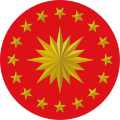
The following is a list of burial places of the Presidents of Turkey. [1]

The following is a list of burial places of the Presidents of Turkey. [1]
| OP | President | Date of death | Place of death | Burial place | City | Site image |
|---|---|---|---|---|---|---|
| 1 | Mustafa Kemal Atatürk | November 10, 1938 | Istanbul Dolmabahçe Palace [2] | Anıtkabir | Ankara |  |
| 2 | İsmet İnönü | December 25, 1973 | Ankara Pink Mansion [3] |  | ||
| 3 | Celâl Bayar | August 22, 1986 | Ankara Gülhane Military Medical Academy Hospital [4] | Mausoleum of Celâl Bayar | Bursa |  |
| 4 | Cemal Gürsel | September 14, 1966 | Ankara Haydarpaşa Hospital [4] | Turkish State Cemetery | Ankara |  |
| 5 | Cevdet Sunay | May 22, 1982 | Istanbul Admiral Bristol Hospital [4] | |||
| 6 | Fahri Korutürk | October 12, 1987 | Istanbul. Korutürk's house in Moda, Kadıköy [4] | |||
| 7 | Kenan Evren | May 9, 2015 | Ankara Gülhane Training and Research Hospital [5] | |||
| 8 | Turgut Özal | April 17, 1993 | Ankara Hacettepe University Hospital [6] | Mausoleum of Turgut Özal | Istanbul |  |
| 9 | Süleyman Demirel | June 17, 2015 | Ankara Güven Hospital [7] | Mausoleum of Süleyman Demirel | Isparta |  |
| 10 | Ahmet Necdet Sezer | Alive | Unknown | |||
| 11 | Abdullah Gül | Kayseri City Cemetery [8] | Kayseri [8] | |||
| 12 | Recep Tayyip Erdoğan | Karacaahmet Cemetery [9] | Istanbul [9] | |||